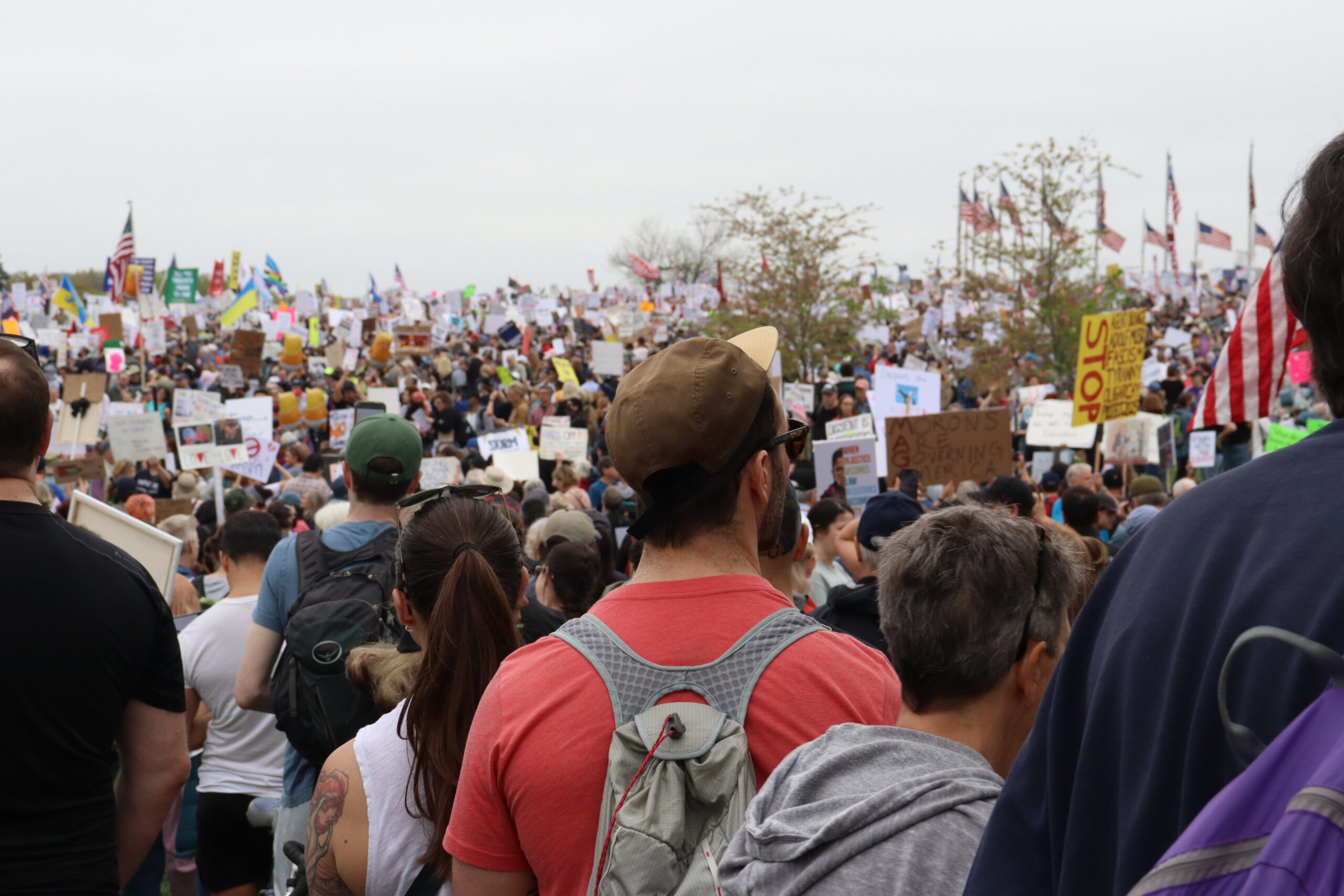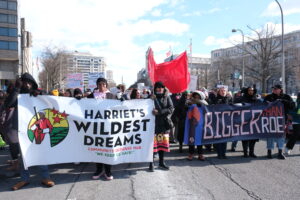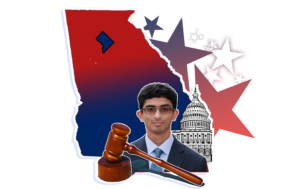Tens of thousands of demonstrators gathered at the Washington Monument in D.C. on April 5 in a protest titled, “Hands Off!” Organizers wrote on their website that the demonstration was a response to the “brazen power grab” of the Trump administration.
The D.C. demonstration was one of over 1,200 protests organized across all 50 states, with an estimated 500,000 people registering to participate in protests nationwide. More than 150 groups, including the American Civil Liberties Union and the Women’s March, partnered together to organize the protests around the country.
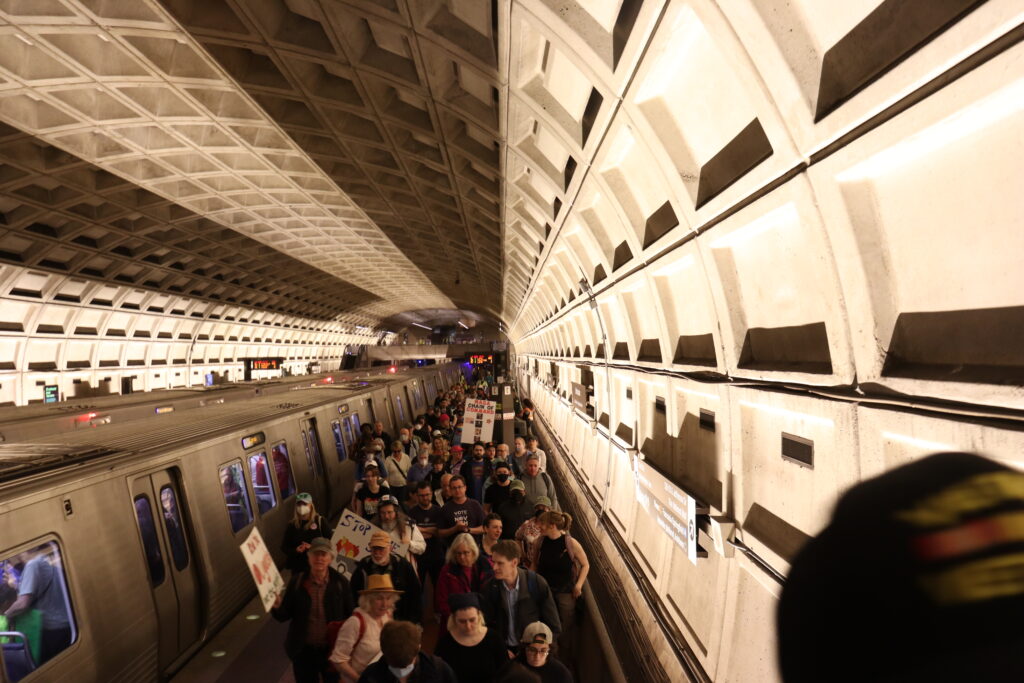
Photo by Chih-Rong Kuo The Smithsonian Metro Station is packed with demonstrators.Photo by Chih-Rong Kuo
On the National Mall, demonstrators held up various signs protesting Trump and Musk’s shuttering of the U.S. Agency for International Development (USAID), rollbacks of abortion rights, the gutting of the Department of Education, repression of pro-Palestine speech, anti-LGBTQ+ policies, and more.
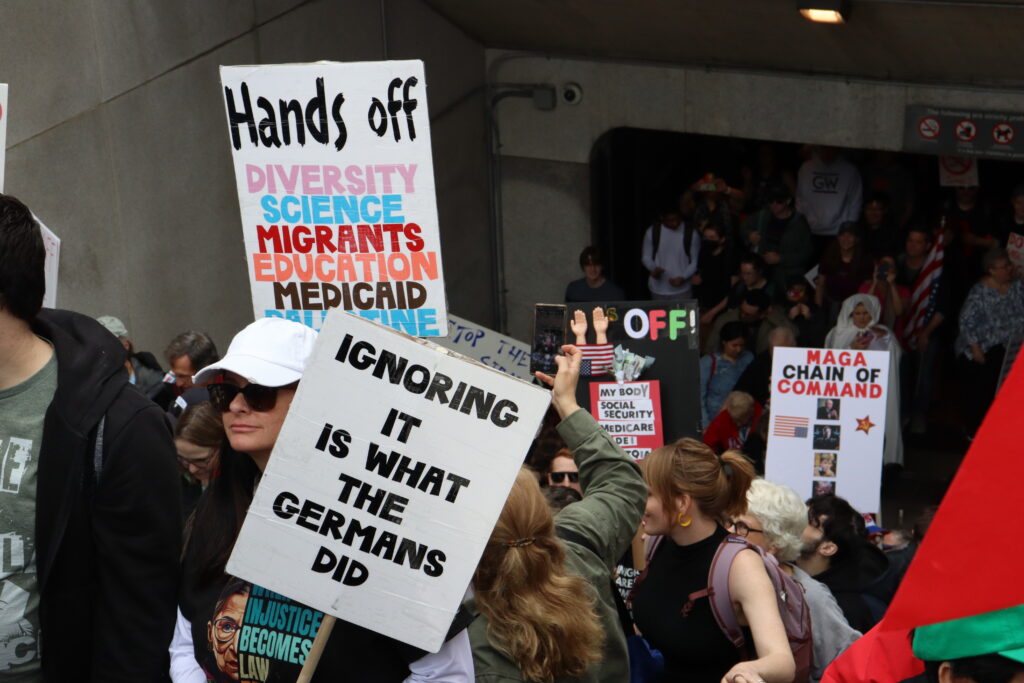
Photo by Chih-Rong Kuo Protesters hold up signs outside the Smithsonian Metro Station.Photo by Chih-Rong Kuo
Many D.C. college students, including students from Georgetown, joined the crowds of protesters. Carleigh Heckel (CAS ’27) said she attended the rally to demonstrate the strength of resistance against the current administration.
“I felt like it was my duty to this country, to its history, to show up, to be on the right side of things, to oppose its administration’s doing, and to show that there is a vibrant, alive opposition,” she said.
College students emphasized the importance of young people being active at rallies.
“College students have always been on the front lines of any social movement. We have been on the right side of history,” Lily Stum, a sophomore at American University, said.
Demonstrators told the Voice about issues they’re personally passionate about and that inspired them to attend the protest.
Lilith and Erica Watkins, a couple from Fairfax, Virginia, said they attended the rally to speak up for transgender Americans. The Trump administration has issued executive orders banning trans people enlisting in the military—which a federal judge blocked—and restricting gender-affirming care for minors, among other policies.
“I’ve lost eight friends this year because of this epidemic,” Lilith Watkins said, referring to suicide within the trans community. “This fight needs to happen. Trans people are so marginalized, and we’re just treated like we’re not human beings. Seeing our rights constantly stripped away just upsets me.”
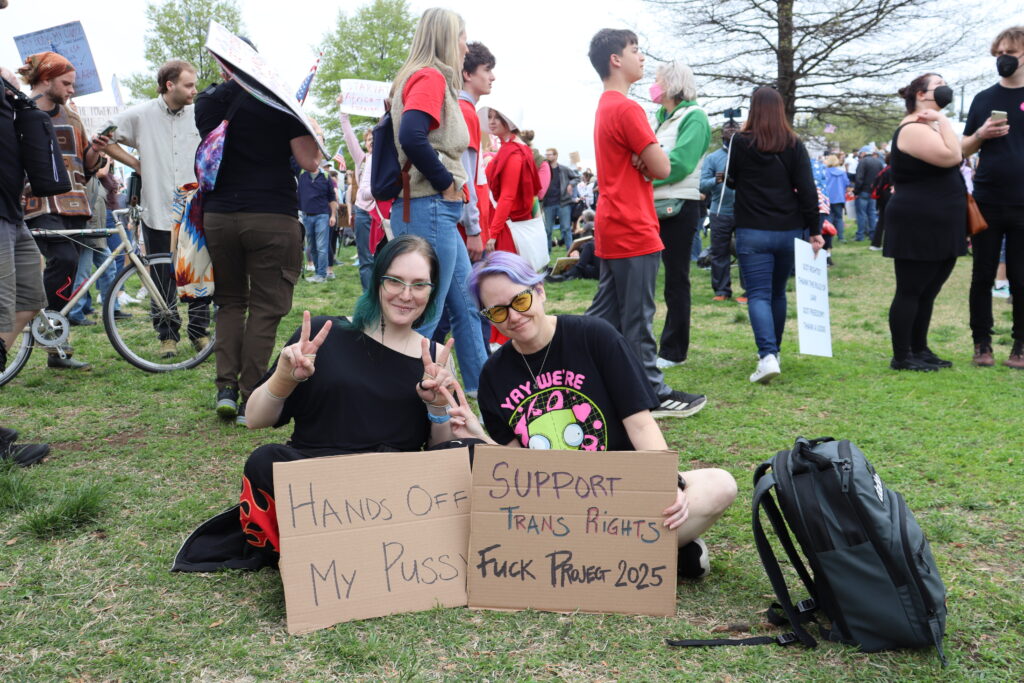
Photo by Chih-Rong Kuo Lilith and Erica Watkins pose for a picture.Photo by Chih-Rong Kuo
Other protesters highlighted education issues. Saturday’s rally came just one day after the “Hands Off Our Schools” rally where GUSA and other student governments led a protest against the Trump administration’s attacks on the Dept. of Education.
Jason Ormsby, a Georgetown professor of health systems administration, said he worries about the impact of the Trump administration on higher education policies.
“I’m worried about particularly how it impacts loans. Right now I know that some people that have education loans can’t get anybody on the phone, can’t ask them about payments that have stopped,” he said. “But I also worry about research funds. A school like Georgetown has a lot of research funds. I think a lot of that, particularly in the healthcare arena, has been stopped.”
On April 1, the Trump administration slashed funding and laid off half the workers at the Agency for Healthcare Research and Quality, an agency within the Department of Health and Human Services (HHS) responsible for healthcare research. The administration has also canceled hundreds of research grants for the National Institutes of Health.
Lisa Newman, a journalist and former speechwriter at the HHS during the Clinton administration, told the Voice that she was worried about the dissemination of misinformation from the HHS, which is currently headed by vaccine skeptic Robert F. Kennedy Jr.
“They’re spewing bullshit. They’re telling lies in a way that is not only detrimental—I mean, what they’re saying is going to kill people,” Newman said.
Other demonstrators told the Voice that they came to protest the Trump administration’s support for Israel’s attacks on Gaza. As the Hands Off! rally continued, a group of pro-Palestine protesters also gathered just a few blocks away for a march to the headquarters of Immigrations and Customs Enforcement.
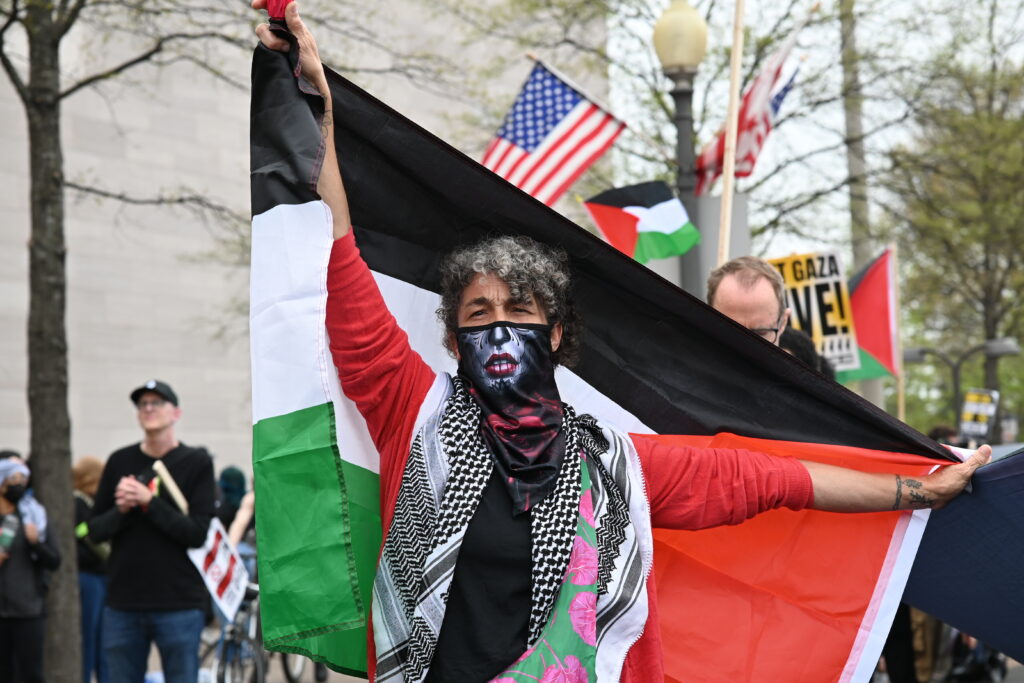
Photo courtesy of Tony Sun A protester at the nearby pro-Palestine rally.Photo courtesy of Tony Sun
Several Hands Off! protest attendees told the Voice that they had attended historic protests in the past, and saw parallels between movements like the civil rights and anti-Vietnam War movements with current resistance to the Trump administration. Georgetown alum Kirby Smith (MSB ’74) said the last protests he went to were the 1971 May Day Protests in D.C., but he felt motivated to show up this Saturday.
“The Vietnam War was terrible—this is terrible. It’s the only time I felt motivated enough to do this,” he said. “For the sake of my children and grandchildren, I wanted to come out and voice my opinion.”
Activist Anita Abbe, who is 80 years old and attended the Civil Rights protests in the ’60s, felt it was important for her to attend.
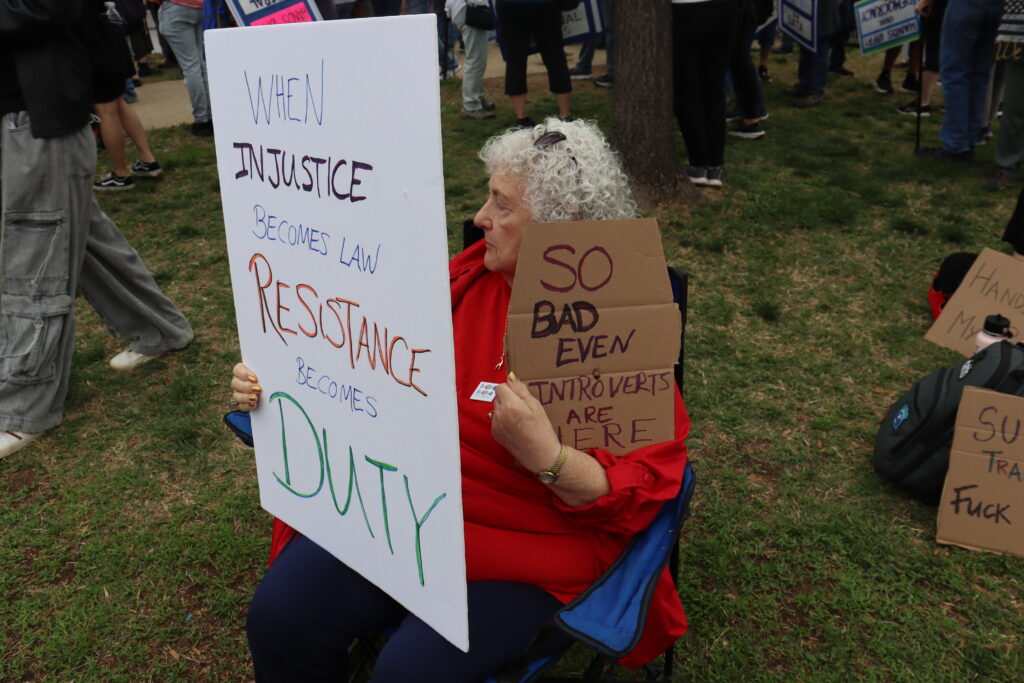
Photo by Chih-Rong Kuo Abbe holds up two signs while sitting on a portable lawn chair.Photo by Chih-Rong Kuo
“Even though I’m in my 80s, I still feel it’s important to do my duty, and I think that what’s going on in this culture is immoral, and I think that our country is in a constitutional crisis,” she said. “It just has to stop. If we’re gonna save our country, this is the time.”
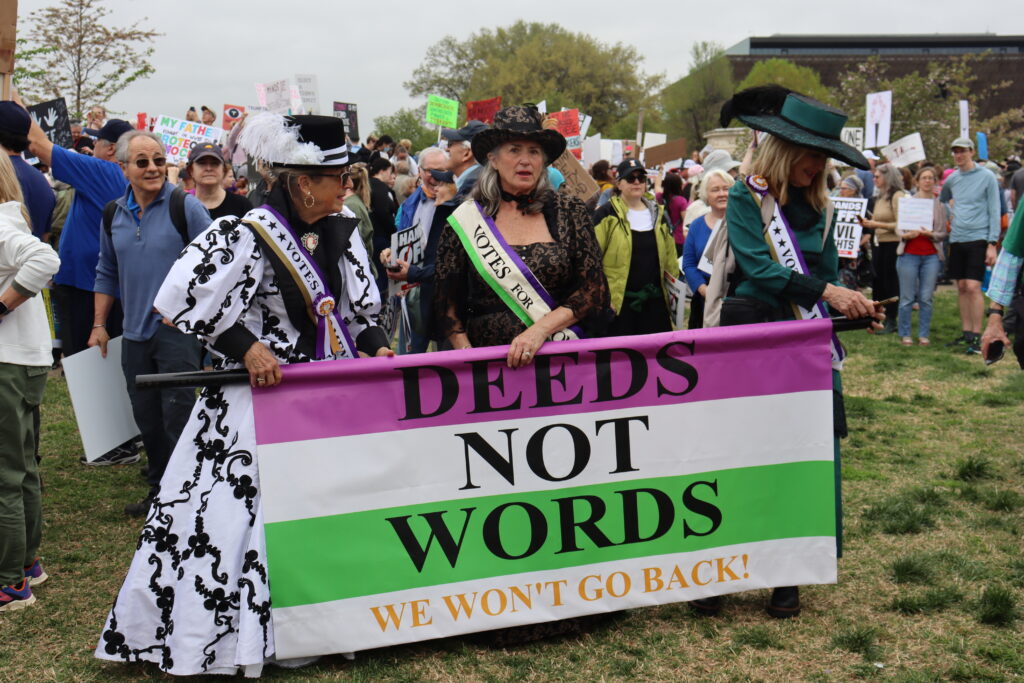
Photo by Chih-Rong Kuo Demonstrators dressed in suffragette costumes hold up a banner.Photo by Chih-Rong Kuo
Smith said that Georgetown graduates in particular should voice their concerns with the Trump administration, especially if they are in positions of power.
“The Republicans are hiding. They’re all afraid of Trump. I think it’s shameful. We’ve got a lot of graduates at Georgetown in Congress,” Smith said. “There’s quite a few Georgetown graduates in the Capitol. They should speak up and fight this whole situation.”
Current students also emphasized the importance of the Georgetown community doing its part to resist the Trump administration. Heckel said that being in D.C. can make this a bit easier.
“Being in D.C. has given me access to a lot of things that I wouldn’t have had elsewhere. That’s a big part of it, like being able to go to a protest like this, and then meeting people who have been or were federal employees and who have been facing this very directly has mattered a lot,” she said.
To Heckel, student activism is important because young people will face long term consequences of current policies.
“I feel like we could be doing more as a campus in this community,” she said. “Ultimately we’re going to inherit a lot of the consequences of this, and we’re going to have to clean up the government and clean up the mess that’s been made.”
Aaron Pollock contributed reporting.


